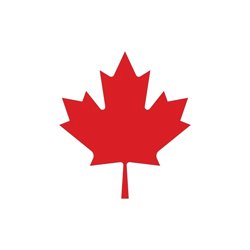Canada is one of the favoured countries by Indian students as their study abroad destination. It is home to a bunch of top-rated universities and colleges with affordable tuition fees as well. This makes it all the more appealing. The fact that Canada offers some stellar job opportunities is the cherry on top. Their easing of travel restrictions and Post-Graduation Work Permit (PWP) rules have led to this surge in student intake. Apart from all these, the scenic beauty, multicultural diversity, and all-welcoming people are worth it.
Study Abroad Canada has tripled its international student population over the past decade, thanks to its globally recognized universities offering a world class education, highly practical programs with hands-on learning and some of the most affordable tuition fees among English-speaking countries. Enjoy top quality life in the ‘most liveable cities’ of Vancouver and Toronto and advance your career in one of the very resource rich, industrialised and stable economies.
For those seeking Study abroad Canada opportunities, along with valuable Canada study visa guidance, the country presents an exceptional and comprehensive educational experience that opens doors to a brighter future.

Fall- September / Winter- January / Summer- April and May
100+ Universities and colleges
800,000 International students in 2022
2,26,450 Indian students in 2022
15,000 to 20,000 CAD
700 to 2000 CAD






A Valid passport.
Proof of approval by a designated institute.
Proof of funds.
Passport size photographs.
Immigration Medical Examination (IME).
Statement of Purpose
Language Profiency Test
Bachelor mark sheet
| Intake | Months | Deadline |
|---|---|---|
| Winter Semester | November / December | Jun / July |
| Spring Semester | January / February | August / September |
| Summer Semester | April / May | October / November |
| Fall Semester | August / September | March / April |
| Academic Level | English Test | Band / Score |
|---|---|---|
| Diploma / Advanced Diploma / Certificate | IELTS / TOEFL / PTE | 6.0 / 85 / 55 |
| Bachelor Degree | IELTS / TOEFL / PTE | 6.5 / 90 / 58 |
| Post Graduate Diploma / Certificate | IELTS / TOEFL / PTE | 6.0 / 85 / 55 |
| Master Degree | IELTS / TOEFL / PTE | 6.5 / 90 / 60 |
| Sr. No. | Degree | Average Fees (CAD) | Average Fees (INR) |
|---|---|---|---|
| 1 | UG | CAD 30,000 | INR 16,15,000 |
| 2 | PG | CAD 20,000 | INR 9,54,000 |
| 3 | PG Diploma | CAD 17,744 | INR 9,08,772 |
| 4 | Diploma | CAD 10,000 | INR 7,76,086 |
| 5 | PhD | CAD 25,000 | INR 19,40,213 |
| Sr. No. | Type of Expense | Amounts in CAD |
|---|---|---|
| 1 | Food | CAD 300 |
| 2 | Accommodation | CAD 400 – CAD 600 |
| 3 | Transportation | CAD 100 – CAD 250 |
| 4 | Internet | CAD 30 – CAD 60 |
| 5 | Miscellaneous | CAD 600 – CAD 700 |
Here’s a list of other tests you may have to take in order to seek admission in a Canadian institution:
Yes, degrees from Canadian institutions are accepted worldwide and known for their quality of education.
Indian students are allowed to work for 20 hours per week during an ongoing session and full-time during vacations. You can also get up to three years of extension post completion of your studies depending on your program duration.
Canada is a country where high-quality education is accessible at tuition rates lower than in many other countries. However, before you depart from India, it is important to take into account expenses such as accommodation, food, health coverage, and travel, in addition to your tuition fees when calculating the estimated cost of studying in Canada. This will assist you in effectively planning your budget. The amount you will spend on tuition fees varies depending on the type of qualification and institution you choose. To cover these expenses, you will need approximately between CAD 13,000 and CAD 35,000 per year.
Students wishing to take a study gap in Canada must justify their reasons. Here are some commonly accepted reasons:
The Student Direct Stream (SDS) program was introduced by Immigration, Refugee and Citizenship Canada to expedite the visa process. This program has not only accelerated the visa process but has also made it more streamlined and convenient.
SDS allows applicants to receive their visas within 4-6 weeks. Moreover, if an eligible student applies through SDS, it is highly likely that their application will be processed within 20 days from the date of submission.
Here are concise steps to follow when writing an SOP for university applications:
Step 1: Compelling Introduction
Begin with a captivating opening, using a memorable phrase or quotation that conveys your motivation and story.
Step 2: Highlight Academic Background
Provide an overview of your educational records and achievements, presenting them in engaging tables or formats.
Step 3: Justify Course Selection
Explain your specific reasons for choosing the course and demonstrate your research to show genuine interest.
Step 4: Strong Conclusion
Craft a powerful concluding paragraph that summarizes key points and reaffirms your commitment to the field of study.
Tailor your SOP to showcase your unique qualities and make a persuasive case for your university admission.
Here are the top universities for MS in Canada:
Diploma courses in Canada offer internships, allowing students to gain valuable first-hand experience in a corporate setting and pursue promising job prospects. Canadian institutions go the extra mile by partnering with reputable companies, providing students with a wide range of placement opportunities. Moreover, many institutions employ career specialists to guide students through the placement process and support them in securing desirable employment. Share
Frequently asked questions about Canada
Here are some answers to help you know Canada better
Moving to a new country is not easy. The lifestyle, classroom environment, transportation – everything is going to be different from India. And we know you have a lot of questions in your mind, so have answered common questions students like you raise about living and studying in Canada.
Moving to a new country is not easy. The lifestyle, classroom environment, transportation – everything is going to be different from India. And we know you have a lot of questions in your mind, so have answered common questions students like you raise about living and studying in Canada.
Yes, 10+2+3 system is accepted for post graduate (PG) diploma programs however, for masters in Canada, almost all universities require 10+2+4. However, certain universities may accept 10+2+3 for masters in selected programs on a case-to-case basis.
Unlike India, there are two parallel education systems in Canada wherein colleges and universities are separate entities. Colleges offer PG diplomas and universities offer masters programs. Some universities may also offer PG diploma programs in selected courses.
Choosing a program and an institution solely depends on your interests, academic background, and budget. To decide where to study and what to pursue, you can start by creating a list of your interests and skills and spend some time reflecting upon it. Do your research to understand which skillset or interest has a good scope professionally. Narrow down your choices accordingly and search for relevant courses and institutions. You’ll also have to take intakes in Canada of your preferred courses into consideration, because not all universities or colleges offer programs in all three intakes.
Our handy guide can help you choose a course that suits your profile and needs the best. You can book a free counselling session with our experienced counsellors who can advise you on course selection, application submission, and visa procedure.
Pursuing masters in Canada can be one of the best decisions of your life since it’ll not only enhance your technical skills but also give your CV an edge over others. As an Indian student with an undergrad degree, you should be ideally looking for an institution that emphasises on practical knowledge, hands-on experience and getting you job-ready.
Canadian universities and colleges provide a research-based learning approach wherein you’ll be implementing all the concepts and ideas you gather in the classroom.
Begin by taking a look at the subjects you learnt in your undergrad program, list down the ones that interest you. Narrow down to your preferred niche and search for possible programs and universities.
Applying to Canadian universities and colleges would also require you to take language and/or aptitude tests. So, do consider your academic scores while deciding what and where to study. Look for the intake offered for your preferred courses and prepare accordingly.
Our experienced counsellors can help you identify and secure the university or college where you can thrive. Visit your nearest IDP office for free advice on how to further your post-graduate career in Canada.
The International English Language Testing System (IELTS) is the most preferred English language proficiency test accepted by almost all institutions in Canada; and is also advised as per Student Direct Stream (SDS) – the faster way for Indian students to acquire Canadian visa. However, globally, Canadian institutions are open to accepting other proficiency tests as well (do check the official website of your preferred institution for the same).
Indian students are allowed to work for 20 hours per week during an ongoing session and full-time during vacations. You can also get up to three years of extension post completion of your studies depending on your program duration.
For a one-year program, you can acquire a work permit of one year while for programs with duration of 2-4 years, you can get a work permit of up to 3 years (visa rules are subject to change, please check the official website for the same).
Yes, degrees from Canadian institutions are accepted worldwide and known for their quality of education.
As an Indian student, you can opt for on-campus residence facility or look for an off-campus accommodation. Most universities in Canada offer dormitories or townhouses for students from other countries. Living as a resident on-campus is a very affordable option, however you need to apply for it separately, and well ahead in time to secure a slot for yourself.
If you are unable to find such accommodation or wish to stay alone, you can get a space for yourself on rent in shared apartments/condominium. Remember, the rentals will vary from city to city. Your IDP counsellor will also help you find an accommodation that works out the best for you.
If you are under 18, you need to submit a custodian letter in your visa application along with the rest of your documents.